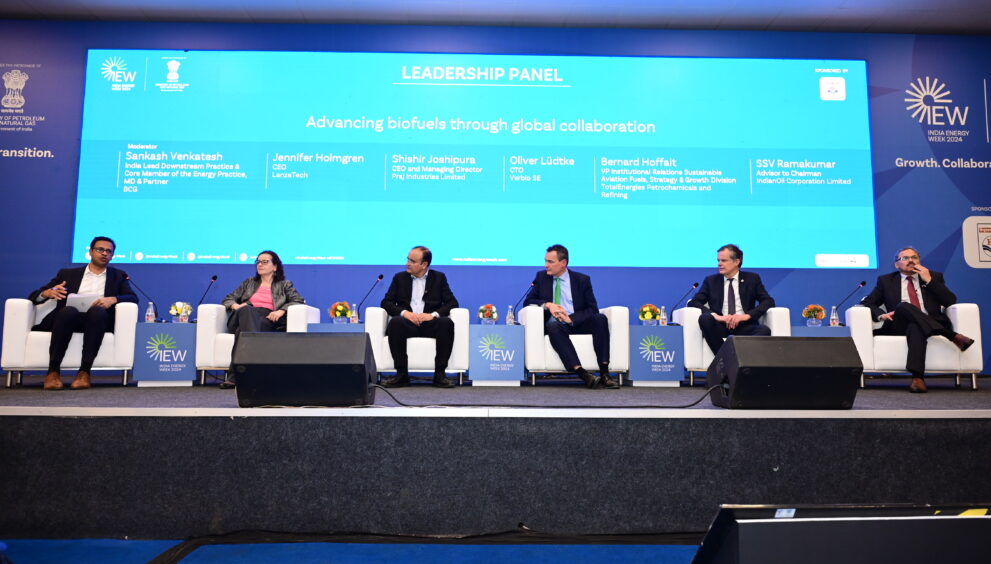Becoming A 7 Trillion Economy by 2030 Through Stronger Partnerships

This year saw the 2nd edition of the India Energy Week, which achieved greater heights by being “larger, better, and stronger”. It gave a platform to a diverse energy diaspora to interact and share their challenges.
In a recent interaction with BW Businessworld, Sankash Venkatesh, Managing Director and Partner, Bengaluru, Boston Consulting Group, shared his experience and insights from the India Energy Week (IEW) and drew upon his experience from the energy space. Calling it a “good achievement” for India, Venkatesh enumerated reasons why he sees the IEW transforming India’s positioning in the energy sector.
Transformative Role of IEW
First, it is a holistic platform addressing the different types of fuels and engages everyone in the value chain, domestically and internationally. “It addresses the full basket of fuels, whether the traditional oil and gas or the newer forms of biofuels, solar, wind, etc., which are more on the sustainable side of things. It provides conversation and confluence of minds where conversations can be had holistically as opposed to one fraction over the other.”, said Venkatesh.
Second, the phenomenally diverse energy diaspora it attracts from across the globe creates a pool of intellect that can collectively address the challenges being faced in the energy transition and what the future holds for us. “IEW had representation from numerous countries with the stature of individuals being that of ministers, chief executive officers (CEOs), etc. from the global side, which was complemented with the energy leaders and spectrum of companies from the Indian side – private and public sectors”, he added.
Thirdly, Venkatesh highlighted the different dimensions that IEW brought to the table such as start-ups, digitalization, indigenization, innovation, etc., thus giving way to differently sized companies.
Meeting Growing India Inc’s Energy Demand
India is currently sitting at the epicentre of growth where it is expected that India will become a seven trillion US dollar economy, given the annual growth rate of 7 per cent. “It is a happy market to be in”, asserted Venkatesh.
To meet this growth rate, it is imperative to presume that India will be able to meet the growing energy demand. Venkatesh addressed certain challenges that will be posed in meeting the energy demand by fragmenting the problem statement from the perspective of the demand side and supply side.
“In India, it is going to take a whole set of complex and innovative solutions as we are still import dependent on a variety of fuels. We have a large diverse geographical area as well as population and range of affluence, and people who need energy at different levels. So, we will have to see the equation of solving the demand from a balanced manner in terms of making sure all legs of the ‘Quadrilemma – Security, Access, Affordability, and Sustainability’ are equally kept in focus”, explained Venkatesh while elaborating on the demand side of the challenges.
On the supply side, much emphasis needs to be placed on the diversification of energy resources to meet the growing demand. “Geographically, we will need to source it from all options that we have as well and we should chase all types of fuels and not over-index on just the oil and gas or the renewables”, he added.
Venkatesh called for a balanced strategy to ensure that the energy demand is growing efficiently.
Incentivising Risk-Reward in the Sunrise Sector
To meet the growing demand, the technology requirements cannot be sidelined and to facilitate innovation, public and private investments will be required. India will be required to explore and build the technologies, “explore the hydrocarbons and quickly put them into production”. There is a need to push for financial and technological partnerships to get newer technologies to India and leverage them.
“We should look for incentivizing risk-reward to a greater degree and bring in processes which are much more agile, and decision-making happens at breakneck speed. In terms of risk-reward, we should be embracing processes which will give good rewards for people who are taking bets and bringing in newer technologies and not optimised just for costs, etc.”, advised Venkatesh while emphasising the need to strike strategic and better partnerships.
In terms of technology partnerships, Venkatesh highlighted an example of offshore exploration in production explaining that certain technologies are available only to a few global or mega companies and are not available within the Indian ecosystem. The lack of a balanced risk-reward construct becomes a limiting factor in attracting these technologies to India.
The government and Indian companies can participate in risk-reward sharing and attract global investments. By way of tax incentives, tariffs, low-interest financing, public-private partnerships, and regulatory support, the government can incentivise investments in renewable infrastructure, given that companies need assurance and security owing to long gestation periods and associated high risks.
Giving an example, of a way the government could incentivise, Venkatesh said, “If you don’t charge say custom duties right now and help bring in some of the engineering equipment and build mega-scale units, it will start producing products on which you will have additional revenue streams”.
How Can India Lead the Charge in Mitigating Climate Change?
India has been taking many initiatives to advance its stand in the energy sector and achieve its Nationally Determined Contributions (NDCs). One such example is the International Solar Alliance’s initiative – “One Sun One World One Grid” which has set the tone and rallied the right things to do across the world, thus exemplifying its commitment to the renewable space.
Another way India has been leading the charge is by bringing a balanced conversation to ensure that ‘just transition’ happens.
India also houses technology giants and has the best human capital which will be available to the world whether it’s just product innovation or services on both sides of things.
























































































































































































































































































































































































































































































































































































































































































































































































































































